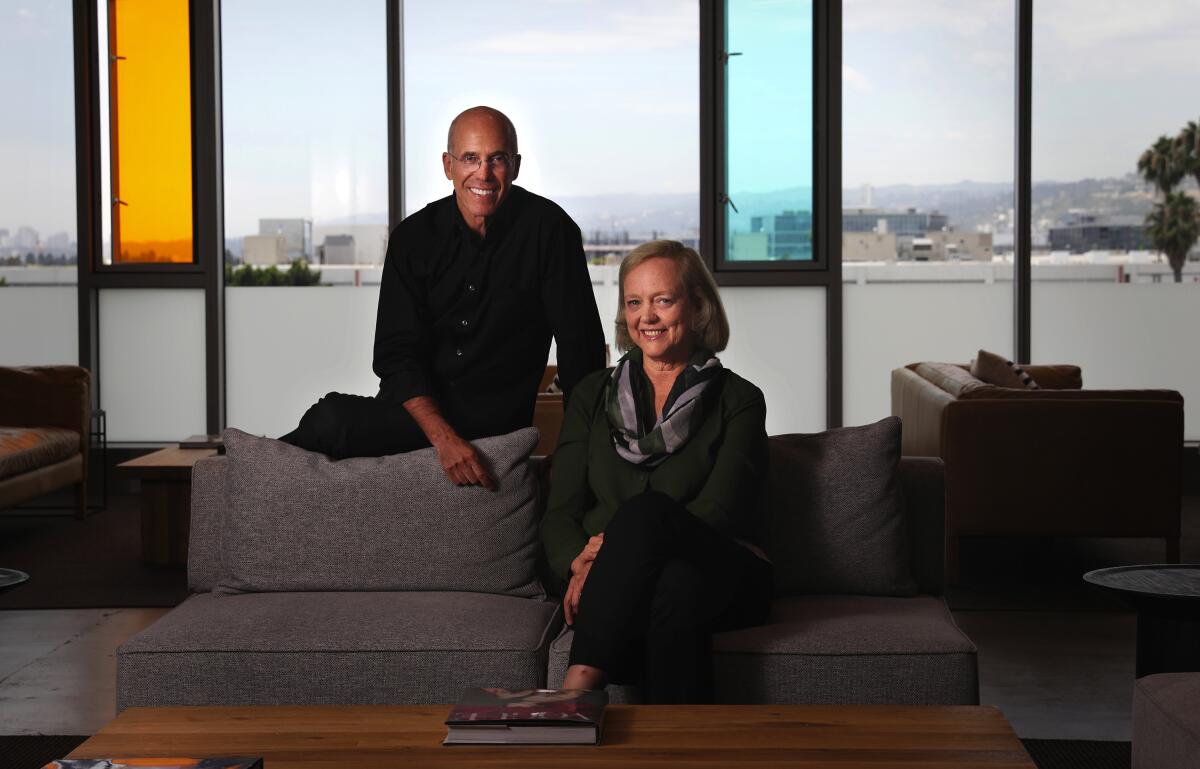Another Quibi executive leaves streamer weeks after strong launch

- Share via
Another Quibi executive has left the Hollywood company, nearly three weeks after it launched its long-awaited streaming service, which has debuted to a strong start.
Megan Imbres, the company’s head of brand and content marketing, said in a note to staff that she’s made “the very hard decision to leave Quibi.” Imbres joined the company in April 2019 and built a marketing team from zero, according to her LinkedIn page.
“It feels like an opportune time of transition where I can take some time to identify my next challenge,” Imbres wrote. She did not immediately respond to a request for comment.
Imbres reported to Quibi’s CEO Meg Whitman. The company confirmed Imbres’ departure, which was first reported in the Wall Street Journal.
“She helped build an all-star brand and content marketing team that is well-equipped to transition Quibi from prelaunch to postlaunch,” the company said in a statement. “We wish her all the best in her next endeavor.”
Quibi is set to launch Monday -- amid the coronavirus lockdown.
Imbres is one of several executives to depart Quibi since last year. Tim Connolly, head of Quibi’s partnerships and distribution, left in August, followed by the exit of Janice Min, head of daily content, in September. In November, Diane Nelson, a respected former DC Entertainment president who was Quibi’s head of content operations, quit. In a letter to Quibi staff, Nelson said she resigned “given several personal priorities and upon much reflection.”
In an interview last month, Quibi Chairman Jeffrey Katzenberg downplayed the executive exits. “It didn’t work out, or wasn’t the right fit or the right place, whatever it is,” he said.
Imbres, a former Netflix product creative director, is leaving Quibi at a time when many Hollywood productions have been shelved because of the coronavirus crisis. But some streamers, including Quibi, have fared well during the pandemic, as people shelter at home and look for ways to be entertained.
Quibi, which launched its app for mobile phones on April 6, said it has been downloaded more than 2.7 million times. On its launch day, the app had more than 700,000 downloads on iPhones and Android phones in the U.S., a strong start, according to San Francisco analytics firm App Annie.
Quibi ranked fourth for U.S. overall apps and second in the entertainment category that day in Apple’s App Store, according to the analytics firm. Since then, it has declined in the rankings, placing 92nd overall among U.S. apps and eighth in the entertainment category in the App Store on Tuesday, according to App Annie’s site.
San Francisco app market research firm Sensor Tower said it believes Quibi has had more than 2.5 million adopters, calling it a “solid base” that is more than double what HBO Now achieved on mobile during its first month in the U.S.
“Quibi’s performance thus far has been impressive given the factors at hand,” said Sensor Tower cofounder Alex Malafeev in a statement. Sensor Tower said Quibi’s app ranked fifth in the U.S. on the week of April 6 and dropped to 27th on the week of April 13 based on downloads from Apple’s App Store and the Google Play Store.
Unlike many other streaming services, Quibi is currently available only on mobile phones. Its shows are told in chapters of 10 minutes or less. The service costs $4.99 a month with ads and $7.99 a month without ads. The company is offering a 90-day free trial.
Quibi has raised $1.75 billion and recruited some of Hollywood’s biggest stars and directors, including Steven Spielberg and Liam Hemsworth. It has sold $150 million in ad inventory for its first year.
The company’s original marketing message pitched Quibi as entertainment for people on the go. But that changed after the pandemic pushed people to stay at home. Quibi executives maintain people will still use its streaming service for “in-between moments,” like the time between Zoom calls.
Even before the coronavirus crisis, some analysts were skeptical whether consumers would pay for short-form content on mobile phones, especially when Verizon’s mobile video platform go90 failed to generate a large enough audience.
“Consumers just aren’t in the habit of paying for short-form videos, and other services that tried it have failed,” Ross Benes, an analyst with research firm eMarketer, said in an email.
Quibi is working on getting its content to TVs in the future, which should help it reach a wider audience, Benes said.
“Even when some restrictions lift, most people are likely going to be spending more time than usual at their homes for a while,” Benes said. “So there’s a more captive TV audience for them to lure right now.”
More to Read
Inside the business of entertainment
The Wide Shot brings you news, analysis and insights on everything from streaming wars to production — and what it all means for the future.
You may occasionally receive promotional content from the Los Angeles Times.











